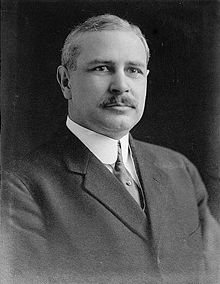James Fielder
| James Fairman Fielder | |
|---|---|
 |
|
| 35th Governor of New Jersey | |
|
In office January 20, 1914 – January 15, 1917 |
|
| Preceded by | Leon R. Taylor (Acting) |
| Succeeded by | Walter Evans Edge |
|
In office March 1, 1913 – October 28, 1913 Acting |
|
| Preceded by | Woodrow Wilson |
| Succeeded by | Leon R. Taylor (Acting) |
| Member of the New Jersey Senate | |
|
In office 1908–1913 |
|
| Member of the New Jersey General Assembly | |
|
In office 1903–1904 |
|
| Personal details | |
| Born |
February 26, 1867 Jersey City, New Jersey |
| Died | December 2, 1954 (aged 87) Newark, New Jersey |
| Political party | Democratic |
| Spouse(s) | Mabel Crowell Miller (1874–1953) |
James Fairman Fielder (February 26, 1867 – December 2, 1954) was an American politician of the Democratic party, who served as the 35th Governor of New Jersey, from 1913 to 1917, with a break of several months when he stepped down from office to avoid constitutional limits on serving successive terms.
He was born in Jersey City, New Jersey on February 26, 1867 to United States Congressman George Bragg Fielder.
After law school, he became a member of the New Jersey General Assembly representing Hudson County, New Jersey from 1903 to 1904. He was then a member of the New Jersey Senate from Hudson County from 1908 to 1913.
The New Jersey Senate convened in January 1913 after Woodrow Wilson had won the 1912 Presidential Election and Fielder was selected to serve as President of the New Jersey Senate. This set him up to become acting Governor of New Jersey starting on March 1, 1913.
Fielder resigned from his Senate office on October 28, 1913, so as to "create a vacancy in the governorship and avoid constitutional limits on succeeding himself". After winning "re-election," he took office on January 20, 1914, and served a full term in office, from January 20, 1914 to January 15, 1917.
Fiedler died on December 2, 1954 of a heart attack at Mountainside Hospital. He was buried in the mausoleum in Fairmount Cemetery, Newark.
...
Wikipedia
